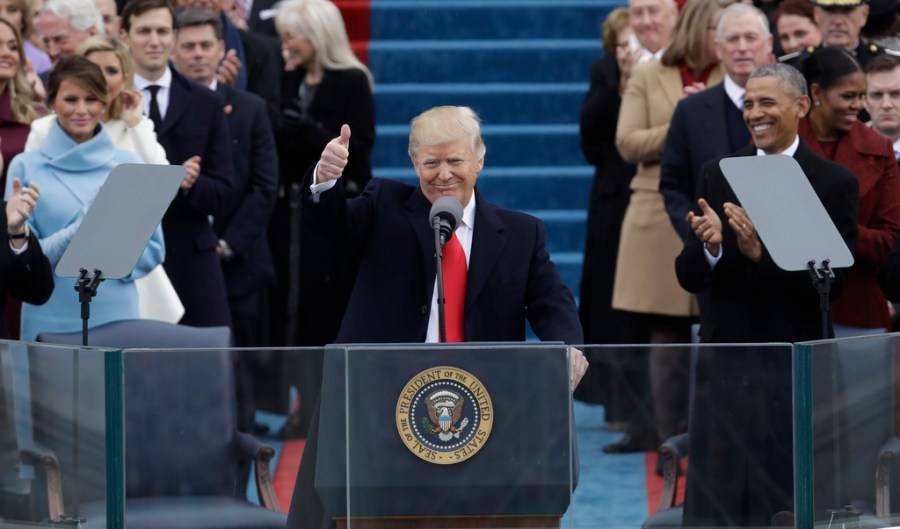
As he was leaving the dais in the aftermath of President Trump’s first inaugural address in 2017, President George W. Bush was purportedly overheard by three different people to have said, “That was some weird sh–.”
It is certainly true no one could possibly mistake President Trump’s “American carnage” rhetoric eight years ago with the high-minded speechifying of Abraham Lincoln’s second inaugural address (“With malice toward none, with charity for all”) or Thomas Jefferson’s first (“We are all Republicans, we are all Federalists”).
Most Americans and media commentators reasonably believe that President Trump is, ironically, predictably unpredictable in his capacity to shock and unsettle — or, as my high school seniors would say, “trigger” his audience. His speeches are a halting combination of grievance laced with braggadocio, often chaotic but highly entertaining riffs of meandering consciousness, far cries from the aspirational tenor of Barack Obama or the folksy eloquence of Bill Clinton.
Of course, no one knows what he is going to say in his second inaugural address on Jan. 20. Chances are he will deliver on oration teeming with MAGA triumphalism. But if Trump wanted to be true to form, if he wanted to use the grandest of political stages to deliver a message absolutely nobody would have predicted, he would strike a conciliatory note of genuine humility and grace. He would acknowledge the potency of his own divisiveness, gracefully conceding that half the country is somewhere between dismayed or terrified by the prospect of another Trump term.
He could go even further by admitting, generally, that he made mistakes in his first term, and because he is as flawed and human as the rest of us, will probably make more in his next. Rather than fanning the flames of ideological division and partisan rancor, a speech undergirded by a spirit of genuine civic reconciliation would act as a balm at a time when Americans of all political stripes are surely fatigued by their own cynicism and division.
He will never have a better opportunity to claim the higher and historic ground of enduring relevance than on Jan. 20. He should take it and shock the world in the process.
Granted, this is perhaps wishing for a political fairytale that has no hope of realization. Why would Donald Trump change? He has already won the presidency. Is barred by the 22nd amendment from running again. Even his detractors will admit he has triumphed against the odds, securing the greatest political comeback in American history. His approval ratings are at all-time highs.
What in his past signals that an inaugural speech rooted in unexpected high-mindedness is even a remote possibility for a 78-year-old famous for doing things his way?
A few things.
First, there are those who believe the assassination attempts have sanded down Trump’s rougher, more vindictive, edges. Since winning a second term he has spoken compassionately about so-called Dreamers, stating he thinks they should be allowed to stay in the country permanently.
Second, it’s good politics. He hasn’t bullied Florida Gov. Ron DeSantis into giving Marco Rubio’s Senate vacancy to his daughter-in-law, as most political observers assumed he would. Most surprisingly, he hasn’t even promised to support a primary challenge of those Republicans who potentially vote down some of his nominees.
This isn’t entirely without precedent. Other presidents have made sudden and dramatic pivots in their political lives. Lyndon Johnson famously opposed civil rights for decades before using the nation’s grief over President Kennedy’s assassination to aggressively push for the Civil Rights Act of 1964.
President George W. Bush campaigned on a “humble” foreign policy in 2000, derisively speaking of “nation building” in a manner that never could have been predicted after the attack of 9/11. Even Lincoln — the Great Emancipator — focused his early efforts on stopping the spread of slavery rather than abolishing it altogether. Jefferson opposed strong federal executive power until he had the chance to unilaterally complete the Louisiana Purchase.
Inaugural addresses, at their best, can paradoxically capture both a specific moment in time and the enduring spirit of the American polity itself. By stressing the values of unity, by highlighting the power of unum over pluribus, and by declaring the outset of his presidency to be a totem of renewal in the waters of American history, Trump can rise above his moment in time.
Will he do it?
Probably not. But stranger things have happened in the twists and turns of the American republic. A citizen can hope. And hope, I do.
Jeremy S. Adams is the author of the recently-released book from HarperCollins entitled “Lessons in Liberty: Thirty Rules for Living from Ten Extraordinary Americans.”












